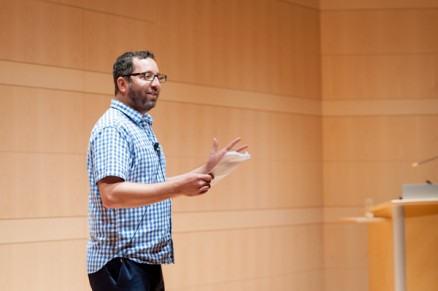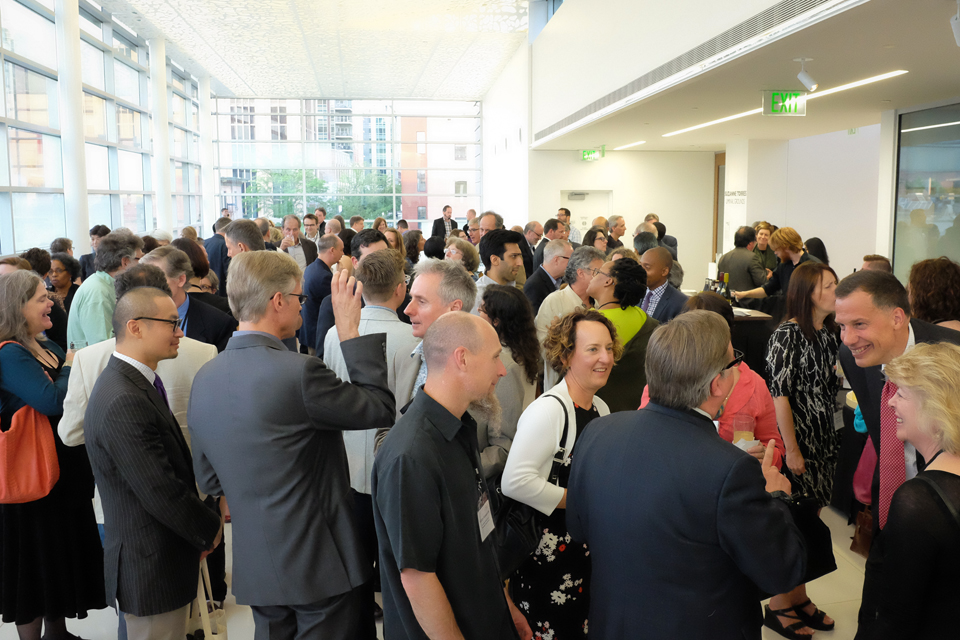Numbers matter, but so do individuals. Data is incredibly useful, but not without context. There is a long history of numerical thinking in the humanities, but what counts, and why we count, are complex questions that neither software nor equations nor modeling can adequately explain.
These were some of the arguments presented at the 2015 annual meeting of the Consortium of Humanities Centers and Institutes (CHCI), hosted this year by UW-Madison’s Center for the Humanities (CfH) June 5-7. The CHCI, one of the leading international networks for conversation and debate on the past, present, and future of humanities research, education, and public scholarship, has long been housed at the John Hope Franklin Humanities Institute at Duke University. Annual meetings are held around the world; this is the first time that UW-Madison was chosen as the location.
In January 2017, administration of CHCI will be transferred to UW-Madison's Center for the Humanities, amplifying the spotlight on humanities outreach and scholarship here. The Center for the Humanities will serve as the fiscal agent for the worldwide consortium and provide important operating and staff support.
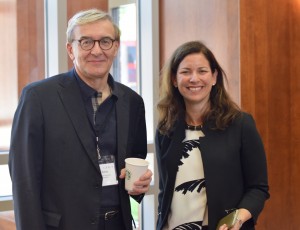 Sara Guyer, director, UW-Madison Center for the Humanities, with Victor Bailey, director, Hall Center for the Humanities, University of Kansas. (Photo courtesy of Judith Buchanan)
Sara Guyer, director, UW-Madison Center for the Humanities, with Victor Bailey, director, Hall Center for the Humanities, University of Kansas. (Photo courtesy of Judith Buchanan)
"We are thrilled to organize and administer the CHCI from Madison," says CfH director Sara Guyer, who will assume a five-year presidency of CHCI in 2017. "It means our university will be closely tied to some of the most exciting work happening globally in the humanities."
The CHCI's annual meeting, which draws leaders of humanities centers and institutes around the world, typically features illustrious speakers, heads of funding agencies, and leading scholars addressing key challenges in the humanities. CHCI members return to their centers and institutes with fresh insights and new ideas.
This year's theme was Humanities by the Numbers, and it spoke to a provocative issue—what Slate magazine recently called "the consummate hot-button topic in the humanities."
Keynote speaker Jill Lepore, author and professor of history at Harvard University, set the tone as she took the podium for her keynote talk — "Countless: the Humanities as a Body of Evidence" — on Friday evening, June 5, in the Conrad A. Elvehjem Building at the Chazen Museum of Art.
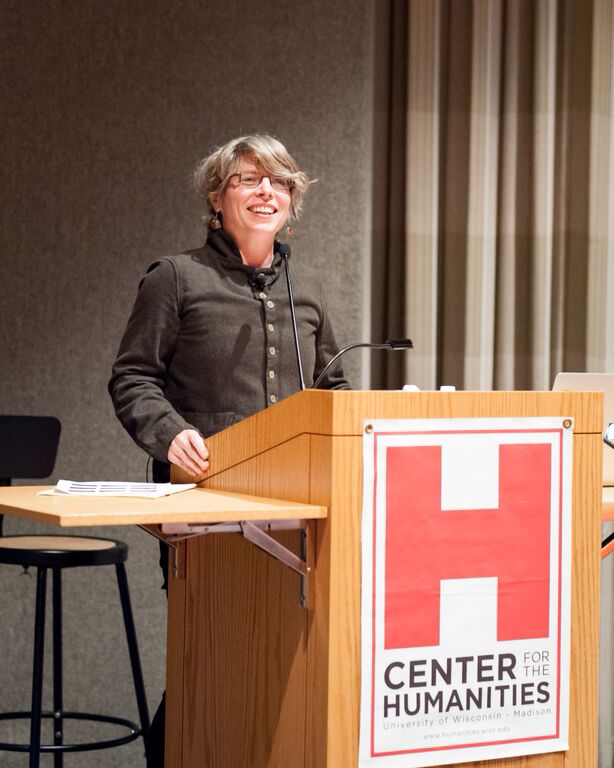 Keynote speaker Jill Lepore, professor of American history, Harvard University, on Friday, June 5 at the Elvehjem Building. (Photo by Nathan Jandl)
Keynote speaker Jill Lepore, professor of American history, Harvard University, on Friday, June 5 at the Elvehjem Building. (Photo by Nathan Jandl)
"I'd like to celebrate intellectual freedom by disagreeing with the theme of your conference!" she announced. There was a startled pause, then a ripple of appreciative laughter — after all, criticism and dissent are intrinsic to the humanities — and with that, the meeting was underway.
Lepore's talk was grounded in what she called a "creepy story" about the 1919 murder of a woman — Lucina Broadwell — in rural Vermont. Using the same storytelling method she employs in her popular New Yorkerarticles and her best-selling books, Lepore focused on one individual and one event to show changes in the way Americans came to view clues, evidence, crime, and even death itself.
"Let's talk about the inhumanity of numbers," she said. "Her vital statistics, date of death, and ages of her children are now part of a national database on violent crime, but the only number that mattered to Lucina Broadwell was one: herself. Quantification minimizes the need for the personal."
Humanists, said Lepore, "are needed at the scene of every crime. Not to look at the many, but at the one. Not numbers, but words. Not distance, but closeness."
Her talk drew impassioned questions about crises that involve large numbers of people, such as genocides. She acknowledged the importance and role of "aggregate and scale," but pointed out that she herself has written about America's history of exterminating its native peoples.
"I argue that what humanists do is take the data we know about and put it into a language that has force and beauty," she says. "You can tell a story with numbers but using big data sometimes obscures the stories of those who are behind the numbers."
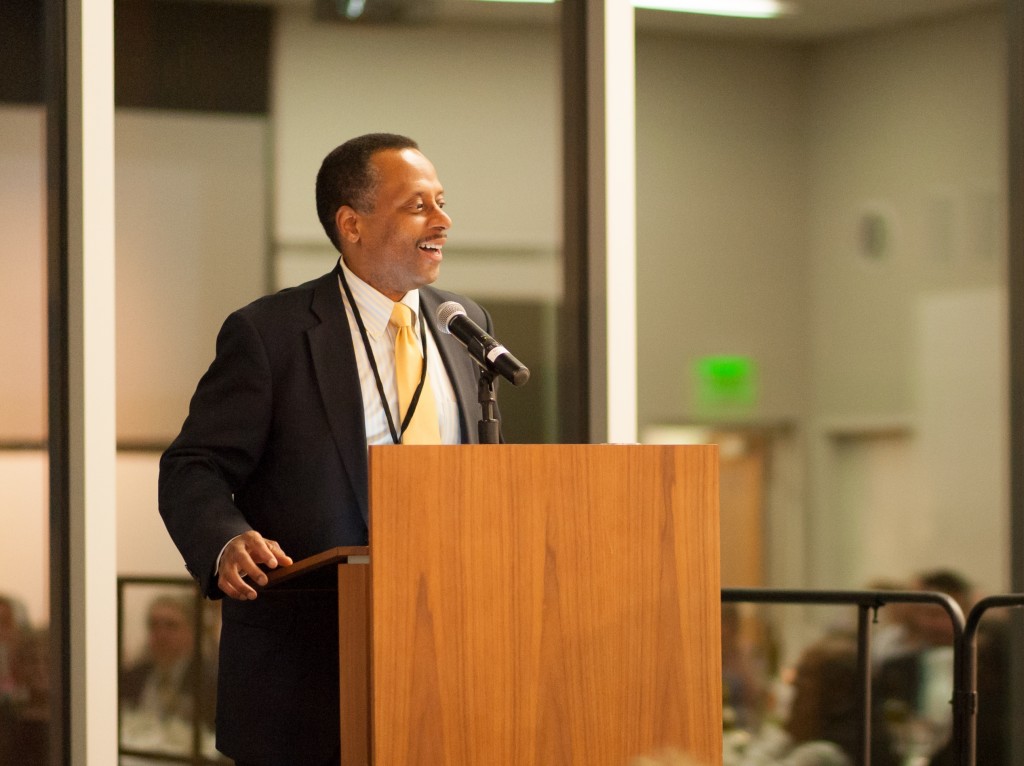 Earl Lewis, president of the Andrew W. Mellon Foundation, addresses the consortium on Saturday, June 6, at the Madison Public Library. (Photo by Nathan Jandl)
Earl Lewis, president of the Andrew W. Mellon Foundation, addresses the consortium on Saturday, June 6, at the Madison Public Library. (Photo by Nathan Jandl)
Throughout the weekend, talks, workshops and roundtables featured leading scholars from UW-Madison (including Jordan Ellenberg, John D. MacArthur and Vilas Distinguished Achievement Professor of Mathematics; Gregg Mitman, Vilas Research and William Coleman Professor of History of Science, Medical History, and Environmental Studies; and Caroline Levine, professor of English), as well as leading thinkers from other universities including Harvard, Yale, and the University of Virginia.
Scholar Franco Moretti, who founded the Stanford Literary Lab (and is often referred to as "the father of the digital humanities"), made the case for what he called "computational criticism" — that is, the study of literary history through the use of "big data." He has helped develop algorithms scholars can use to survey vast databases of literary texts, looking for patterns in style, theme, narrative plotting, and much more. Patterns always emerge when scanning tens of thousands of novels, Moretti said, but he challenged scholars to determine their significance.
"That's the next step,” says Hilldale and Virginia Woolf Professor of English and Women’s Studies Susan Friedman, director for the Institute of Research in the Humanities, who chaired Moretti's plenary lecture on June 7. "Learning more sophisticated ways of interpreting the numbers is the key. Moretti sees these new, number-based methodologies as supplements to, not replacements of, other ways of understanding literature."
Susan Stanford Friedman, director of the UW-Madison institute for Research in the Humanities, chats with attendees during the conference. (Photo by Nathan Jandl)
That view surfaced again and again throughout the conference, from Khalil Gibran Muhammad, director of the Schomburg Center for Research in Black Culture, discussing what numbers don't tell us about race, to Ellenberg, who borrowed the title of one of psychologist B.F. Skinner's papers for his own talk on June 7: "Shakespeare Might As Well Have Drawn His Words Out of a Hat."
Skinner, a behaviorist who believed that language, even that of the great poets, could be analyzed as just another behavior, wrote a controversial paper in which he re-cast Shakespeare as more of an emitter than a writer. The alliteration that countless students had been taught to appreciate, Skinner argued (using what is known as the "null hypothesis significance test"), was just a random accident.
"But he was wrong about this," Ellenberg assured his audience. "Of course the alliteration is there, and of course Shakespeare intended it. Skinner wasn't using the right viewing device. It's like looking at Mars with binoculars. You won't see the moons of Mars with binoculars — but that doesn't mean the moons aren't there."
Mathematical methods, he said, can often reveal the similarities between two models – but they offer the temptation to ignore the differences.
Greg Downey said he faces the limitations of numerical analysis every day in his work as associate dean for social sciences in the College of Letters & Science. Downey, who is also a professor of mass communication and information studies and faculty director of the new L&S career course, helped lead a CHCI workshop called "Assessing, Ranking, Measuring."
"Numbers always require narratives," he said. "Humanities scholars possess and practice the skills that help us place numbers in social context, imbue them with shared meaning, communicate them to key stakeholders, and open them up to civil critique."
The conference concluded with an address by William Adams, director of the National Endowment for the Humanities, who announced that "the only number I'm going to talk about is the number 50," as he reminded his audience that the NEH is celebrating a half-century anniversary this year.
"When the NEH was created in 1965, there was a belief that a great economic power needed the humanities, that without history and the study of democratic principles, we can't effectively practice those principles," said Adams.
Adams described several NEH initiatives, including the Common Good project, which "seeks to bring the humanities into the public square and foster innovative ways to make scholarship relevant to contemporary issues."
The UW-Madison Center for the Humanities is widely acknowledged as a leader in this realm, with its public humanities fellowships and Humanities Exposed projects that fund graduate students’ projects in the community.
By locating the CHCI's administrative function within the Center for the Humanities, this focus is likely to increase.
"Our responsibility is to make our work accessible and understandable to a broader public," said Adams. "[The CHCI] is a universe of people and institutions whose movement in this area is one of the most important in many years — both inside and outside the academy."
